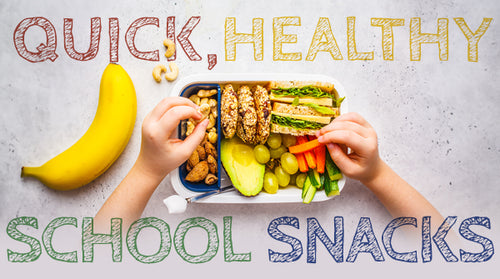Now that schooltime is around the corner, you've probably thought of helping your child develop good study habits, the kind that will help them succeed now and throughout their lives.
However, it's just as important for them to develop good health habits, which can have just as great an impact—if not greater—as learning how to study properly. Here are some creative ways to do just that.
Trim Tech Time
Too much time on smartphones, computers and other devices can impact health in surprising ways, especially for children.
For example, San Diego State researchers found that teens who stay glued to their smartphones report more unhappiness. While total abstinence didn't lead to more happiness, the study showed that limiting the use of digital media to a little less than an hour a day led to the happiest teens.†The information provided is not an endorsement of any product, and is intended for educational purposes only. NaturesPlus does not provide medical advice and does not offer diagnosis of any conditions. Current research on this topic is not conclusive and further research may be needed in order to prove the benefits described. The conditions and symptoms described may be indicative of serious health problems, and therefore should be brought to the attention of a qualified healthcare practitioner.
Getting kids to break the constant habit of phone checking can be a challenge, however.
"Kids try to multitask by doing homework and studying while having text conversations with friends and using apps on their phones,' says clinical child psychologist Katie Davis, PsyD. "Performance, of course, suffers. And when kids socialize so much on their phones, they don't practice engaging in face-to-face interactions."
Along with limiting technology, Davis suggests parents maintain positive habits themselves and model healthy technology use all the time. "It's difficult to tell children to be present at dinner while sitting with your own phone on the table."
Limiting time spent in front of screens is most effective by using positive reinforcement, says psychotherapist Amy Moreira, LMHC. "Every time your child initiates turning off the TV when the time is up, they should be provided a reward—verbal praise, a hug or other desired and feasible reinforcer."
Kids may complain they're bored without their phone. "As parents, we feel it is our job to keep our children from being bored, thereby handing them a screen to occupy them or getting them to do some sort of activity," says Julia Harper, PhD.
Harper notes that parents often wonder what to do when their kids are bored. "Most parents are surprised when I answer, 'nothing.' Boredom is a gift. It is a wonderful way to build problem-solving skills, rouse creativity and support a person's ability to adapt in life."
To reverse boredom, offer attractive options.
"If you ask your child if they want to do an art project, they will usually say 'no' and opt for a screen," says Serena Ryan, founder of The Confident Homeschooler.
"But if you spread out a dollar-store tablecloth on your kitchen table and lay out paints and brushes and canvases," Ryan continues, "they will jump at the opportunity to be creative. As parents, if you spend a few minutes each night planning some activities and experiences for the following day, you will notice a decrease in screen usage."
Ryan also suggests creating a schedule for the day to help kids know what's expected of them before they can ask to use technology.
In addition to practicing fun, engaging activities, Ryan recommends assigning a time allotment to a chore, such as 15 minutes of screen time for taking the trash out.
"Or keep a jar of popsicle sticks with a chore listed on each stick and an amount of screen time on the other end," Ryan says. "Once the child completes that chore or activity, they are awarded screen time."
Flip Food Choices
Good childhood nutrition promotes success in life in many ways beyond overall health.
Children who practice healthy eating habits have better concentration and alertness as well as good mental and emotional health, according to research from Kansas State University. They also gain protection later in life against obesity and related health issues.†The information provided is not an endorsement of any product, and is intended for educational purposes only. NaturesPlus does not provide medical advice and does not offer diagnosis of any conditions. Current research on this topic is not conclusive and further research may be needed in order to prove the benefits described. The conditions and symptoms described may be indicative of serious health problems, and therefore should be brought to the attention of a qualified healthcare practitioner.
However, swapping out bad eating habits for healthier ones isn't always easy unless you intervene early and often.
"Teaching kids to eat healthy is all about repetition," says nutritionist Amy Goodson, RD.
"One of the best ways to get kids to eat better is to offer healthy foods over and over. Instead of candy, offer fruit. Instead of candy bars, offer whole-grain granola bars. This can help young children adapt their taste buds to like healthy foods and have a taste for them as they age."
Goodson cautions against using food and treats as rewards for things such as potty training, cleaning and tidying up, etc. Instead, offer a non-food reward, such as stickers or doing a fun activity.
"This prevents children from leaning on sweets as something they deserve for doing the right thing," says Goodson.
She adds, "It is not to say your child can't ever have a treat—you should definitely provide those every now and again—but they should be considered a ;sometimes food.'"
Goodson notes that depriving kids completely of their favorite goodies could backfire in the long run and lead to binge eating.
Getting your kids into the habit of eating their vegetables isn't always easy. A tactic Goodson refers to as "bridging" foods can help. This approach simply refers to gradually including more of the healthy food into a food your child currently likes.
For example, if your child hates broccoli but loves rice and cheese, try cheesy rice with pieces of broccoli initially, Goodson suggests. "Then bridge to broccoli rice casserole, then to broccoli with cheese. Bridging can help them acquire the taste for healthier food."
Another helpful tactic is to add small amounts of treats to healthy meals and snacks, such as sprinkling in a small amount of chocolate chips into a homemade trail mix with nuts and dried fruit.
Restore Relationships
Sibling rivalry and family dynamics can influence a child well into adulthood.
"We as parents all want our children to get along with one another and even get along with them better ourselves," says Lakiesha Russell, a licensed professional counselor. "As a parent, I know firsthand how important it is for my son and daughter to be able to have a good relationship."
For starters, Russell suggests spending more family time together.
"When you show your children that you value the time as a family unit by doing things that are strengthening the relationships, such as watching a movie together, eating dinner and playing games, you reinforce the understanding that you are intentional about the family," she says. "It also shows you care about how the family operates and about building those memories that they can recreate when they have their own families."
In addition, spend time with each individual child.
This doesn't have to involve hours a day, says Russell. "For example, spend 30 minutes with them before bed talking about what's important specifically to them. This one-on-one time will decrease the possibility of the child feeling as if they are not important or that another sibling is more important."
In addition, family meetings can help everyone bond by allowing open communication among each other in a safe space that you have created, including group rules.
And while it may sound counterintuitive, parents should avoid intervening in sibling issues; an exception may be if fighting or name-calling breaks out.
"As a parent, you want to allow your children the autonomy to work out their differences. This will increase their confidence in being able to address challenging situations among their peers," says Russell.
Reducing sibling rivalry can include setting small goals, says Moreira. "Communicate with your child the desired goal and perhaps encourage 20 minutes of playtime without fighting every day."
Each time your children engage in this desired behavior, they should receive a reinforcer.
For example, you can give each of your children one point per day that they engage in peaceful playtime. At the end of the week, your children can join their points together and pick a reward that has been pre-established based on their motivators, such as extra playtime, stickers, etc.
"Your children will then have to work together to achieve their goals and then can share their rewards together," says Moreira. "This strengthens your original goal of establishing a better relationship between them. Win-win for parent."
†The information provided is not an endorsement of any product, and is intended for educational purposes only. NaturesPlus does not provide medical advice and does not offer diagnosis of any conditions. Current research on this topic is not conclusive and further research may be needed in order to prove the benefits described. The conditions and symptoms described may be indicative of serious health problems, and therefore should be brought to the attention of a qualified healthcare practitioner.The information provided is not an endorsement of any product, and is intended for educational purposes only. NaturesPlus does not provide medical advice and does not offer diagnosis of any conditions. Current research on this topic is not conclusive and further research may be needed in order to prove the benefits described.The conditions and symptoms described may be indicative of serious health problems, and therefore should be brought to the attention of a qualified healthcare practitioner.
Like this article? You’ll love our weekly newsletter
sign up here!
**These statements have not been evaluated by the Food and Drug Administration. This product is not intended to diagnose, treat, cure or prevent any disease.











































































